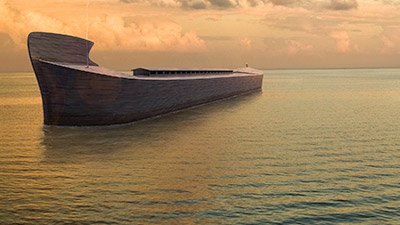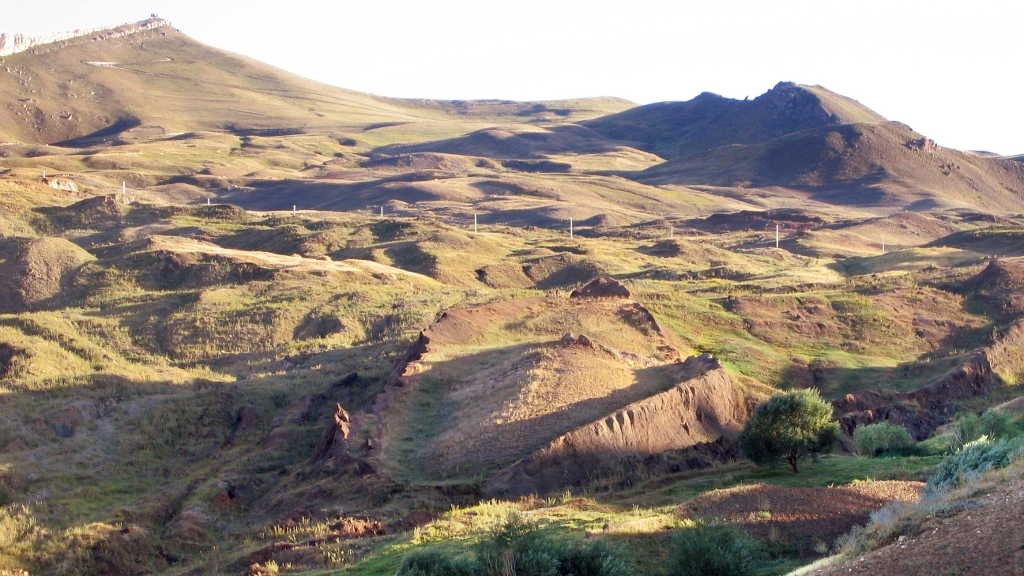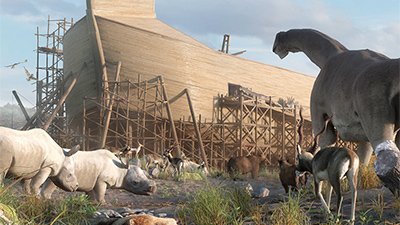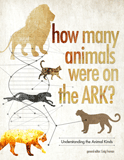
Feeding Carnivores on Noah’s Ark
How Noah likely fed carnivorous animals and dealt with “obligate carnivores” and hibernation—what we can learn from Noah’s faith
We know from the fossil record (most of which is a testimony of the worldwide, globe-covering flood) that some animals were carnivores in the post-fall/pre-flood world. But even if carnivory was prevalent in the late pre-flood world, it is still possible that the animals that God sent to Noah did not eat meat or were omnivores that could have survived for one year without meat. There have been modern examples of animals normally considered to be carnivores that refused to eat meat, such as the lion known as Little Tyke. Additionally, during times of war or natural disaster when meat was unobtainable, zoos and wildlife parks have utilized meat substitutes1 like nuts, peanut butter, coconuts, beans, soy, and other legumes as their protein-source feed for the animals.2
Protein and Taurine Options Available to Noah
However, there are several methods of preserving or supplying meat. Meat can be preserved through drying, smoking, salting, or pickling.
However, there are several methods of preserving or supplying meat. Meat can be preserved through drying, smoking, salting, or pickling. Certain fish can pack themselves in mud and survive for years without water—these could have been stored on the ark. Fish eggs, live eels, or fish stored in barrels or sealed wooden crates, earthworms, and snails are just some of the many more protein-packed food items Noah could have brought as food for the animals (Genesis 6:21).
One of the most frequent objections mentioned about the feeding of the carnivores is often the availability of taurine. Taurine is an essential amino acid for the feline kind (often called obligate carnivores) and is often, even in veterinary publications, listed as exclusively found in animal-based proteins. But this is incorrect, and several studies have shown this (more on this later). Additionally, while a critical need for today’s cats, we cannot be sure if the felines brought aboard the ark had reached such a state of obligatory taurine dependence. That may be a post-flood mutation or adaptation.
Furthermore, taurine deficiency is not an immediately life-threatening condition in felines. Cats do have a limited ability to manufacture taurine from other amino acids, and it can take several months before symptoms become apparent.3 But as can be shown below, Noah had the means to keep his felines healthy with enough taurine.
In addition to the earthworms, eels, snails, dried meats, and packed fish described above, Noah may have also brought mealworms and other insects onto the ark as food, and these can be bred for both carnivores and insectivores, providing even necessary, supposedly meat-only amino acids like taurine.4 Cricket or grasshopper flour could have been baked into the equivalent of protein bars or sprinkled on other food, as could the ground seeds of gourds. And plants like amaranth and quinoa yield high-protein feed. Yeast paste and dried seaweed (especially red algal seaweed) also contain high amounts of protein and taurine, so Noah quite likely had many options available to him.5 Additionally, there are some fungi that have moderate levels of taurine, like Enoki and Shitake mushrooms.6 And occasionally in desperate times, as during the Nazi siege of Leningrad in 1941, even obligate carnivores (in this particular case, a tiger) have switched to vegetarian diets and survived for several years.7
Hibernation, Brumation, and Torpor
“Both hibernation and brumation are a type of inactivity in which the animal’s body temperature, heart rate, metabolic rate, and respiratory rate all drop.
Another factor that may have reduced food consumption for both vegetarian and carnivorous animals is that they might have gone into a state of hibernation or brumation/torpor. According to the Sacramento Nature Center, “Both hibernation and brumation are a type of inactivity in which the animal’s body temperature, heart rate, metabolic rate, and respiratory rate all drop. The difference is that hibernation is a term used to describe certain species of these endotherms (warm-blooded animals such as mammals) who undergo this process and brumation is used for ectotherms (cold-blooded animals; specifically, reptiles and amphibians).”8 Torpor can best be described as “light hibernation,” meaning that the animal is not sleeping as deeply and can more readily become fully alert. Many animals today begin to eat less, reduce their metabolic rate drastically, and then “sleep” for long periods of time when the weather gets a little cooler, virtually eating nothing and waking up only for brief periods to drink and sometimes eat a little before reentering brumation/hibernation. And contrary to popular opinion, there are many mammals that do hibernate or go into torpor.9 Often the best conditions for this state are humidity, temperatures between 50° and 68° F (10° and 20° C), and low-light conditions. The outside weather at the time of the flood (rainy and thus likely cool) combined with the lower-light interior compartments of the ark would make ideal hibernation/brumation conditions on the ark. If any of the mammals, reptiles, and/or amphibians went into hibernation/brumation, then food requirements would have been severely reduced.10
God Did Not Set Up Noah to Fail, and Noah Did Not Fail in His Obedience to God’s Commands
When we read the account of the flood in Scripture, it becomes readily apparent that God clearly intended and oversaw the safety of the human and animal passengers on the ark from the planning stage on through to disembarking after the flood. Just a brief perusal of the narrative of Genesis 6–9 emphasizes this point.
Before the Flood
But I will establish my covenant with you, and you shall come into the ark, you, your sons, your wife, and your sons’ wives with you. And of every living thing of all flesh, you shall bring two of every sort into the ark to keep them alive with you. They shall be male and female. Of the birds according to their kinds, and of the animals according to their kinds, of every creeping thing of the ground, according to its kind, two of every sort shall come in to you to keep them alive. (Genesis 6:18–20)
Then the LORD said to Noah, "Go into the ark, you and all your household, for I have seen that you are righteous before me in this generation. Take with you seven pairs of all clean animals, the male and his mate, and a pair of the animals that are not clean, the male and his mate, and seven pairs of the birds of the heavens also, male and female, to keep their offspring alive on the face of all the earth. (Genesis 7:1–3)
As the Flood Commenced
On the very same day Noah and his sons, Shem and Ham and Japheth, and Noah’s wife and the three wives of his sons with them entered the ark, they and every beast, according to its kind, and all the livestock according to their kinds, and every creeping thing that creeps on the earth, according to its kind, and every bird, according to its kind, every winged creature. They went into the ark with Noah, two and two of all flesh in which there was the breath of life. And those that entered, male and female of all flesh, went in as God had commanded him. And the LORD shut him in. (Genesis 7:13–16)
During the Flood
But God remembered Noah and all the beasts and all the livestock that were with him in the ark. And God made a wind blow over the earth, and the waters subsided. (Genesis 8:1)
After the Flood
Then God said to Noah, "Go out from the ark, you and your wife, and your sons and your sons’ wives with you. Bring out with you every living thing that is with you of all flesh — birds and animals and every creeping thing that creeps on the earth — that they may swarm on the earth, and be fruitful and multiply on the earth." So Noah went out, and his sons and his wife and his sons’ wives with him. (Genesis 8:15–18)
Then God said to Noah and to his sons with him, "Behold, I establish my covenant with you and your offspring after you, and with every living creature that is with you, the birds, the livestock, and every beast of the earth with you, as many as came out of the ark; it is for every beast of the earth. I establish my covenant with you, that never again shall all flesh be cut off by the waters of the flood, and never again shall there be a flood to destroy the earth." (Genesis 9:8–11)
God obviously cared about the people and the animals on the ark. He reiterated time and again that his purpose was for them to survive and be healthy enough to be “fruitful and multiply” after the flood.
God obviously cared about the people and the animals on the ark. He reiterated time and again that his purpose was for them to survive and be healthy enough to be “fruitful and multiply” after the flood. Nor were Noah and his family negligent in their duties or of following the commands of God. Four times in Genesis 6–7 it is recorded that Noah did as God commanded him.
- Noah did this; he did all that God commanded him. (Genesis 6:22)
- And Noah did all that the LORD had commanded him. (Genesis 7:5)
- [T]wo and two, male and female, went into the ark with Noah, as God had commanded Noah. (Genesis 7:9)
- And those that entered, male and female of all flesh, went in as God had commanded him. And the LORD shut him in. (Genesis 7:16)
The account of the raven and the dove (Genesis 8:6–12) also shows that Noah acted prudently in determining if the ground was dry. He did not try to accelerate God’s timing nor presume upon God, yet also was not lazy in his duties. Even after removing the covering of the ark and seeing that the ground was dry, he patiently waited another month and a half to hear what God’s plan was for him, his family, and the animals he had cared for (Genesis 8:13–14). He did not grumble about having to care for the animals for this additional time, and when he was commanded to come off the ark, he remembered to thank God for his providence by almost immediately offering a sacrifice (Genesis 8:20).
Conclusion
God’s expressly stated purpose was that he wanted all human and animal passengers on the ark to survive and thrive in the post-flood world, including any carnivorous animals on the ark. Therefore, it was God’s plan for Noah to be able to care for them. Those who do not accept the Bible as the infallible, inerrant Word of God will always doubt, mock, and find excuses (ultimately ignorant ones) to validate their unbelief. But for Christians, how can you continue to cast doubt on God’s ability to enable Noah to carry out his own will during the flood?
Noah strongly desired to follow God’s commands and did what was needed to make sure that the part God gave him would be done to the best of his ability. Noah also showed the validity of what the apostle James would write in Scripture much later: faith without works is useless and dead (James 2:20, 26). The New Testament mentions Noah several times, and each time Noah is mentioned as being actively engaged in showing his faith by his obedience to God (Luke 17:27; 1 Peter 3:20; 2 Peter 2:5). The astute reader will recognize that one passage is missing from the above list. But I want to end on that passage because it gives us the reason behind why Noah built the ark in the first place:
By faith Noah, being warned by God concerning events as yet unseen, in reverent fear constructed an ark for the saving of his household. By this he condemned the world and became an heir of the righteousness that comes by faith. (Hebrews 11:7)
Footnotes
- Mayumi Itoh, Japanese Wartime Zoo Policy: The Silent Victims of World War II (London: Palgrave Macmillan, 2010), 33.
- H. Bieguszewski, C. Lewicki, “Protein metabolism in fur-bearing carnivorous animals. 4. Effect of different composition of the feed and different protein contents on digestibility, N balance and some blood values in Arctic foxes,” Rocznik nauk rolniczych. Seria B. Zootechnika 91 (1969): 603.
- Ryan Llera, “Taurine in Cats,” Accessed June 10, 2021, https://vcahospitals.com/know-your-pet/taurine-in-cats.
- Sarah McCusker et. al., “Amino acid content of selected plant, algae and insect species: a search for alternative protein sources for use in pet foods,” Journal of Nutritional Science 3, no. e39 (2014): 1, https://www.ncbi.nlm.nih.gov/pmc/articles/PMC4473169/pdf/S2048679014000330a.pdf.
- Azusa Kawasaki, et al., “The Taurine Content of Japanese Seaweed,” Advances in Experimental Medicine and Biology, Pt. 2 (2017): 1105, doi: 10.1007/978-94-024-1079-2_88.
- Hiroyuki Kataoka and Naomi Ohnishi, “Occurrence of Taurine in Plants”, Agricultural and Biological Chemistry, 50, no. 7 (1986): 1887–1888, https://www.tandfonline.com/doi/pdf/10.1080/00021369.1986.10867664.
- Henry Shapiro, “100,000 Died in Leningrad Siege,” New York Times, June 29, 1943, 6.
- Sara Tabatabai, “Ask a Naturalist: What's the difference between hibernation and brumation?,” Last modified November 10, 2020, https://www.sacnaturecenter.net/visit-us/nature-blog/news.html?NewsID=70046.
- Bryan Harding, “Which Mammals Hibernate?,” North American Nature, accessed June 7, 2021, https://northamericannature.com/which-mammals-hibernate/.
- Scott Solar, “Preparing Reptiles For Winter's Sleep,” Reptiles, last modified February 7, 2014, https://www.reptilesmagazine.com/preparing-reptiles-for-winters-sleep/.
Recommended Resources

Answers in Genesis is an apologetics ministry, dedicated to helping Christians defend their faith and proclaim the good news of Jesus Christ.
- Customer Service 800.778.3390
- Available Monday–Friday | 9 AM–5 PM ET
- © 2026 Answers in Genesis





